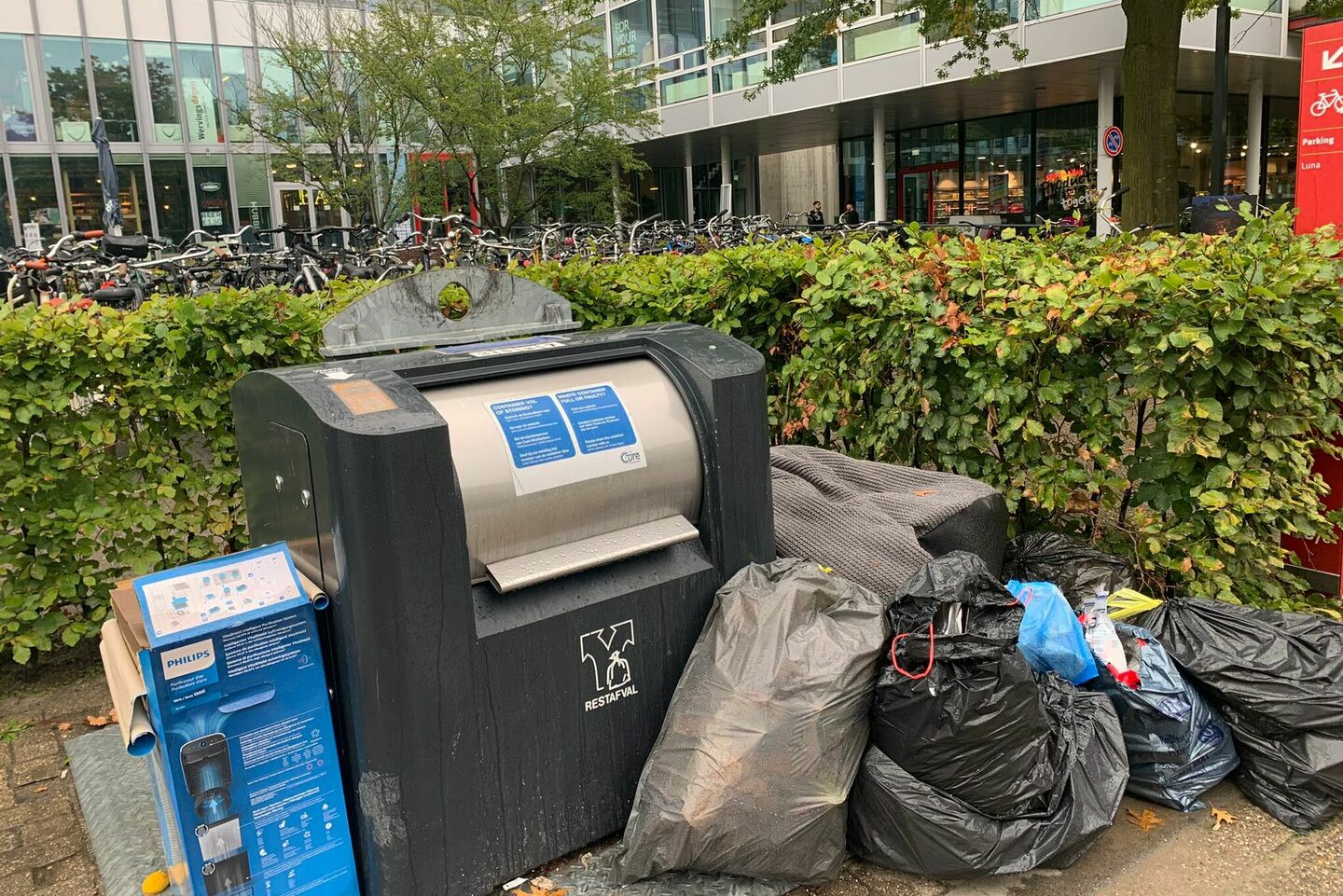
Only enforcement can stop the Luna refuse mountain
Eindhoven municipality does not want cameras to identify offenders
Every week Luna is the site of a trash pile – the name for refuse left beside the dumpsters. With an active rat population and the current cockroach plague, this certainly isn’t a good thing. But how can you prevent people from continually leaving trash beside the dumpster rather than in it? Cursor talked to refuse collector Cure.
Whether the mountains of trash near Luna’s main entrance have been a contributing factor in the presence of a cockroach population and rat families cannot, of course, be established beyond doubt. “But undeniably garbage attracts vermin,” says Bart Hooijmaijers, waste manager and project leader ‘trash piles’ at Cure. He and his colleague Dennis Hendriks, communication advisor and team leader customer service spend much of their time tackling environmental pollution in its various forms, including trash piles.
The trash mountain at Luna has been a problem for years. Now and again there’s a brief absence, just after Cure has come by and collected the trash pile yet again. Not, it should be said, that this problem is unique to the campus or even the city of Eindhoven. “The problem has been ongoing for years, nationally,” says Hooijmaijers. “We even see complete sofas beside dumpsters. Yet there are alternatives: taking it along to the municipal dump or having it collected. For years, the sole focus of the municipality of Eindhoven has been the collection of trash piles, but this hasn’t reduced their number. In 2019 things got completely out of hand and the garbage problem became irritation number 1 on the political agenda. In 2020 a process plan was written, describing how we need to address this problem and with whom. At that point, Cure took the reins in tackling the trash pile problem. We aren’t creating the trash piles, we just collect waste for the municipality of Eindhoven. It’s actually a behavioral problem on the part of the residents of Eindhoven, and here on the part of the residents of Luna. We know this because many studies have shown that 85% of trash pile material comes from the immediate vicinity, not from farther afield, as is sometimes suggested.”
Communication
Cure is ready to collaborate to solve the problem. “We need municipalities, housing associations, community groups, store owners’ associations and others to help us tackle the problem,” says Hooijmaijers. “We made a start Eindhoven-wide back in 2020 by doing more data-gathering and documenting. We saw that some locations had a trash pile every day, at others it appeared once a month. This data enabled us to establish hotspots: places where a trash pile is a frequent occurrence. We were also keeping records of waste collections. Later we also started keeping records of reports of trash piles. Because that’s something else that varies considerably: in some neighborhoods an issue prompts a hundred calls, in other just one call will be made. The extent to which people are bothered by trash left beside the dumpster varies from neighborhood to neighborhood.”
So when a trash pile is reported, Cure checks whether capacity is sufficient. Is the dumpster full? Or is there a service disruption? Hooijmaijers: “Every time waste is collected, we make a note of that to help us understand why trash is being left beside the dumpster. If there’s no capacity problem, the fundamental issue, we move on to communication. Do people know they have to use an access card? Do people know they have to separate waste? We have now produced our folders for new residents in two languages – because we have so many internationals in Eindhoven - and are using more pictograms for people with literacy issues. In shared housing we hang up stickers and posters to make people aware of the right way to do things.”
“We have even done a study of whether trash piles can be prevented by spreading a nicer fragrance around the dumpster,” tells Hooijmaijers. “But when all these measures fall short, there comes a time when enforcement has to be the focus.” This enforcement can’t even be called a fine: people caught leaving their trash on the ground get a bill of 145 euros. This covers the cost of clearing up the mess. Hendriks: “Enforcement isn’t our job; that’s done by Eindhoven municipality’s special investigating officers. We supply them with data, like which hotspots they need to go to. They then search the trash to find clues as to the owners. They work on the spot, opening bags and looking for address details. If they find any, that person can expect a bill.” Hooijmaijers: “Students can be problematic for us,” says Hooijmaijers. “When presented with a bill, international students are sometimes amazed that trash needs to be put in the dumpster not left beside it.”
And now enforcement
But there aren’t enough enforcers to tear open every bag and check thoroughly for address details. In that case, can’t cameras help with tracing people, or perhaps act as a deterrent? “Yes, possibly,” says Hooijmaijers. “And they are already in use in some municipalities. But Eindhoven has decided not to go down this route. Of course, we can say cameras would be our choice but, ultimately, we do our job and it’s for the municipality to decide such matters.” Cursor did ask the municipality of Eindhoven to comment. They made the following statement via Cure: “In consultation between the municipality and Cure it has been decided that Cure will take on the role of spokesperson in this matter.”
Cure collects household waste at Luna and Aurora, Renewi provides the transshipment. At their intermediate location waste is collected in sufficient quantities before being transported to a location run by Attero, which handles the waste processing. So for Cure, Renewi is a partner in the chain, but Renewi also collects waste for TU/e, from the departments for example. So you’ll see both companies driving around the campus. When earlier this year Cursor posted on Instagram about the trash mountain at Luna, Renewi responded by posting that they are keen to help come up with a solution. This prompted Cursor to ask them now for their reaction. Renewi’s Peter van Kessel tells us this is not a matter in which Renewi can take action. This is because their collection contract with the university does not include the Luna and Aurora buildings; they collect garbage at other buildings on the campus.
With its trash mountain at Luna, is TU/e a hotspot? “No,” Hooijmaijers knows. “Yes, it’s often a mess, but hotspots are based on the number of collections and that number compared with the rest of Eindhoven. At some places we are needed every day. We have one truck dedicated to trash piles. It’s on the road seven days a week.” How is their contact with TU/e on this matter? In answering this question, the guys from Cure are succinct: there isn’t any contact.
Mystery
Why people still choose to leave their trash bag on the ground instead of throwing it in the dumpster has the guys from Cure guessing. “I don’t get it,” says Hooijmaijers. “It costs nothing in Eindhoven to throw your trash in the dumpster, or at any rate nothing extra each time (you pay per year, not for every time you open the dumpster, ed.). That’s not so in many municipalities. So why leave it on the ground? Did you forget to bring your access card? Don’t you know how it works? Does the dumpster seem dirty to you? We still haven’t found out.”
Hendriks has another suggestion: maybe sometimes people make a trash pile when they see a problem that isn’t a technical malfunction, like when something in the dumpster is preventing the lid or pull-down door from closing properly. A situation like this is not picked up by the automatic malfunction alarm. Technical malfunctions are, including those reported by the public.” That’s always an important message: report any malfunction you come across. “And we’ll come. Even if the dumpster is only 85% full. For some dumpsters that are heavily used, we’ll be there before that point is reached.”
The good old days?
So do we have to go back to the days before the dumpster? Back to putting our garbage bags out on the street on a certain day in each neighborhood? After all, there was no such thing as a trash pile back then, was there? “No, that’s not the solution,” says Hooijmaijers. That only makes the refuse collectors’ work harder and means that people can only get rid of their garbage once a week or once a fortnight. That could lead to fly-tipping, people leaving their bags in random places, you don’t want that. Neither are the old-school refuse chutes in apartment buildings a solution: a child could fall into one, far too dangerous.”
Solutions
All things considered, enforcement seems the most effective solution. “We are seeing a decline in trash piles where requests for payment have been handed out,” Hendriks knows. “But student areas are the exception.” Hooijmaijers knows why that’s the case: “Every year there’s a new influx…” Nevertheless, charging for removal is the best solution, Hendriks thinks. “Every student has money issues, don’t they? So it strikes a nerve. But Eindhoven’s enforcement capacity is not infinite.” And so Hooijmaijers wants to appeal directly to the university: “If the uni itself were to do something, that would be very helpful. Like sign an agreement with new residents in Luna, stating that when you come and live on campus and you leave your trash beside the dumpster, you have to pay a set amount, or lose your deposit. Provided you agree that upfront, it should be possible.” In response, TU/e’s Real Estate makes a statement that the “building on the TU/e campus is not the property of TU/e. The underground dumpster facility is directly linked to the accommodation provided in the Luna building. PRS leases these housing units independently and without the involvement of TU/e. PRS’s tenants pay for refuse collection via the municipality / Cure by way of their local taxes. Any contractual changes (e.g. relating to the deposit) are therefore a matter between tenant and landlord.”
Hendriks: “Either way, we’re already collaborating in Eindhoven with housing associations and landlords. Vestide had a hotspot, for example, at one of their locations and we chose the times when the student population changes to hang up extra posters. And when the new milieupas (environment card) was being introduced, we wrote to all the housing associations, student housing and expat housing providers asking them to contact us. But only a small percentage responded.” Hooijmaijers thinks there is still ground to be won when the key to properties is being returned. “When you’re checking over the property, check whether the previous tenant left their environment card (giving dumpster access) behind, that helps the next occupant.”
Collection service
Now suppose you have a dilapidated cupboard or a saggy sofa you want to get rid of and you can’t take it to the municipal dump yourself, then ask for a sticker and make a collection appointment. Note that this costs money. If you are officially on a low income and exempt from waste collection charges, then it is free. “It helps if everyone thinks how they can help solve the problem. We can’t do it alone. It’s a problem in our society. A change of behavior is needed,” Hooijmaijers thinks. “Of course, if we could open some cans of enforcers, enough that we could check up on everyone, we might stop having trash piles. But unfortunately that’s a luxury we don’t have.”
Hendriks: “A bit of involvement by the residents themselves is essential. Little things can make all the difference: Is the lid stuck? Report it (via 040 – 250 01 30, ed.). Don’t feel like calling? Complete the short form on the website. In either Dutch or English. Just these steps really help us.” Hooijmaijers also thinks the culture in the Netherlands has changed a little bit: “We are scared to call one other to account. We would rather call the municipality after the event to report it. Of course, if there’s a giant of a man to deal with, you’d be wise to be careful. But if no one mentions the culprit’s behavior to them, we’ll never get this solved. If we think it’s important enough, let’s just say it straight to each other.”

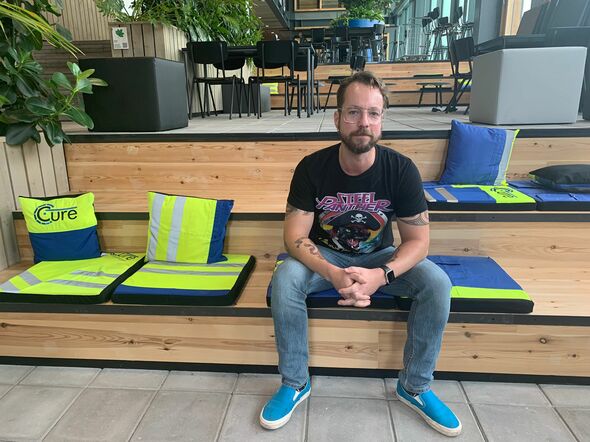
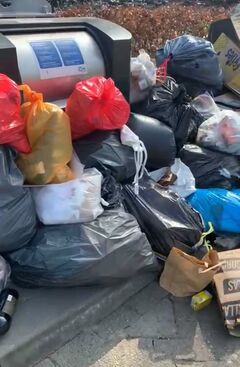
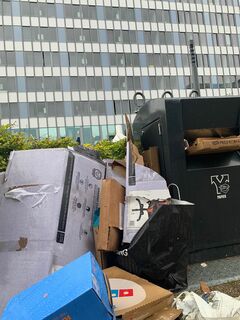
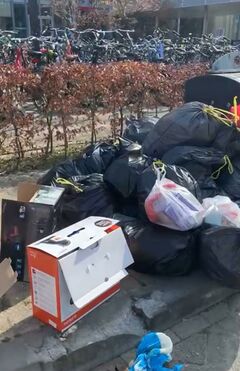
Discussion